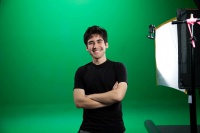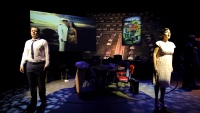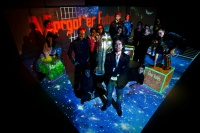 David Murakami divides his time evenly between directing film, directing theater, and combining the two with digital media design for the stage. His interest in film began when he made several award winning films in high school. His creative work gained momentum during his freshman and sophomore years at UCSC, with the creation of 60 short films, two feature films, and one stage play. He discovered his talent to fuse theater and media when he took Theater Arts (TA) classes as a sophomore. After directing a full-length film/theater hybrid work at UCSC, he began pursuing numerous projects in academic and professional settings. A comprehensive list of his work can be found here. David will begin his Masters in Theater Arts at UCSC in the fall of 2014.
David Murakami divides his time evenly between directing film, directing theater, and combining the two with digital media design for the stage. His interest in film began when he made several award winning films in high school. His creative work gained momentum during his freshman and sophomore years at UCSC, with the creation of 60 short films, two feature films, and one stage play. He discovered his talent to fuse theater and media when he took Theater Arts (TA) classes as a sophomore. After directing a full-length film/theater hybrid work at UCSC, he began pursuing numerous projects in academic and professional settings. A comprehensive list of his work can be found here. David will begin his Masters in Theater Arts at UCSC in the fall of 2014.
David considers "public universities...essential for an artistic education. The most important part of being an artist (in my opinion) isn't artistic ability itself, but the ability to contextualize and apply art in the greater world. I like to think of dedicated arts schools or conservatories like the laboratories which build telescopes. They do a fine job of advancing ability and mastery of a craft, but they don't teach how to look through what they've created. Public universities are messy, smashing everything together - art, science, business and politics - but all four are needed in the arts. Art occurs at intersections, where things are least clear. I never trust an artist with a clean desk."
How do you define undergraduate research?
Right now, I look at undergraduate research as self-motivated attempts at applying the theory taught in coursework into a professional setting.
What did you do to prepare for college level work in the film and digital media?
I did research into both the technical apparatus of film making and the human interactions. I sat in on rehearsals at my local theater company to observe the way a director works with actors.
What projects have you worked on as an undergraduate?
David has worked on an extensive range of projects while an undergraduate, including the series "Safety Slug" created for the UC system-wide Police and Fire departments, the "Sponty Demo" created for Facebook Inc., and a suicide prevention spot commissioned by Counseling and Psychological Services at UCSC. Selected projects include:
- Winter, 2012: David was the director and co-writer of a feature film, God Particle. It is "one of my most proudest accomplishments, and the piece that set me on my current track working towards a symbiotic relationship between the projected image and live theater." See the following links for the trailer and poster.
- Spring, 2013: David was the Lead Media Designer for the opera Trouble in Tahiti, directed by Brian Staufenbiel. "This was my first time designing a large professional show, where I was able to have
 real creative collaboration with the rest of the design team. It was also a formative experience for developing my own theoretical framework on how projected media and
real creative collaboration with the rest of the design team. It was also a formative experience for developing my own theoretical framework on how projected media and
traditional scene elements can (and often can not) coexist on stage. Also was the first time I led a team in a professional setting, with fellow undergraduates Sam Clevenger and Tal Kamran assisting me in content creation." The San Francsico Gate reviewed the opera and described David's work:
"And of course, there is 'What a movie!,' the opera's centerpiece and most brilliant achievement. This is Dinah's retelling of her afternoon plunge into Technicolor escapism through the movie musical that gives the opera its title, and it's a beautiful encapsulation of the power of even the cheesiest art to touch our core in unexpected ways."
See the following links for the review, the short excerpt that the review is referencing, and a full performance.
- Summer, 2013: David was the Digital Media Designer in Valley of the Heart, a live stage play directed Luis Valdez . Valley of the Heart was El Teatro Campesino's first experimental multimedia production, telling a Romeo and Juliet story of Japanese and Mexican farmworkers during the era of WWII internment. A review in the Los Angeles Times is here.
- Fall, 2013: David was the Director and Lead Media Designer of A Forgotten Future, a hybrid of stage play and digitial media. "It's hard for me to talk about AFF, partly because there's so much to say,
 partly because even after a year I'm still trying to process the experience. I set out to do something which had never been done before on stage anywhere: using only projectors, adapt a narrative piece of traditional theater for an immersive digital set." See the following links for a full performance and detailed description (skip around to the following times: 1:15, 2:40, and 24:45) and the video proposal.
partly because even after a year I'm still trying to process the experience. I set out to do something which had never been done before on stage anywhere: using only projectors, adapt a narrative piece of traditional theater for an immersive digital set." See the following links for a full performance and detailed description (skip around to the following times: 1:15, 2:40, and 24:45) and the video proposal.
Do you work on projects outside of your academic activities?
Yes, everything listed above was outside my academic activities. Within my major, there are no opportunities for such work.
What projects are you working on now?
I'm currently designing the media for the American premiere of the Adam Gorb opera Anya 17, directing a short play in Mandarin (with assistance of a translator) with the UCSC International Playhouse, assisting with Birth of Stars, editing and scoring (with UCSC alum Aiden McKee) my fifth feature film Private Eyes, designing the Media for UCSC Opera's production of Tartuffe, and writing my next screenplay - a cyberpunk remixing of Paradise Lost, portraying Lucifer as a postmodern Prometheus.
Additionally, my projects so far for next school year (as a Master's Candidate in TA) include working as assistant director in LA for an Opera (not allowed to disclose its title yet), and designing the Media for a re-imagined Merchant of Venice set in the Indian diaspora in San Jose, directed by UCSC faculty member Patty Gallagher.
I also plan on producing my untitled Lucifer film project next year, starring UCSC Alums Ian Dick and Brandon Barnes, and featuring Patty Gallagher.
What has been the most challenging aspect of your current project?
For Anya 17, reconciling the theory behind media design into the professional sphere. Academia is a very nurturing environment for experimentation, but the realities of big budget theater demand fast results, and co-designers who aren't interested in or understand the theory behind your work. It's especially challenging because Media Design is an emerging specialty, and in every professional setting I've worked in so far, I've had aesthetic conflicts with my fellow designers (especially lighting designers). Anya 17 is also challenging from a thematic standpoint. Centered around human sex trafficking, the piece is uncompromisingly dark, and its my job as a media designer to walk a fine line of how explicit to be.
What have you learned from participating in this project?
So far, it's furthered my understanding of how to work the politics of the professional Theater world. How to network with a board of directors, how to ask for additional funding, etc.
Who has been the most important mentor for you, and why?
I can't really think of a mentor figure in my education. Rather, I think if my peers as my mentors, encouraging and pushing me to become better.
What advice would you give students interested in a career in film and digital media?
You have to want it more than anything, and you have to pursue it with everything you have to give. The big myth of the entertainment industry is that you get a "big break", but there are only lots and lots of grueling small ones, and each one is essential for the next. I can clearly trace my recent successes through all of projects, no matter how small. Yes, I've directed five feature films, but only after doing over eighty short ones. And never stop writing!
Also, diversify. Film is an art of many arts. The most important academic decision in my career so far has been taking directing classes from the Theater Arts Department; FDM does not teach you how to work with actors, pick costumes, block bodies, or even tell a story.
Also, get involved in BarnStorm, the student run theater at the base of campus. Almost everything I've done, including God Particle and A Forgotten Future has been thanks to them. It's old, smelly, and not the prettiest theater in town, but it's one of the rare places where aspiring artists can stand up and declare themselves as such, and not get laughed out of the room. It's the kind of resource that sets UCSC apart (and in my opinion, above) from more exclusive programs in USC or UCLA.
How do you balance your projects with your classes and extracurricular activities?
Honestly, not well. My philosophy has always been that the application of academia takes priory over academics. My GPA is by no means excellent, but in the end it paid off; I have been accepted into the Masters program in Theater Arts. Ultimately, the entertainment industry is more concerned about your resume than your degree.
What are your plans for after you finish at UCSC?
Continue designing for theater and opera, as well as directing independent film in the bay area.
What are your long term professional goals?
Long term dream job: Hollywood Director (and writer)
How has your gender, age, and/or background influenced your experience in your field?
I mean, to some degree having white male privilege has not hurt. I am also half Japanese.
Compiled by Rebecca Anderson
June, 2014